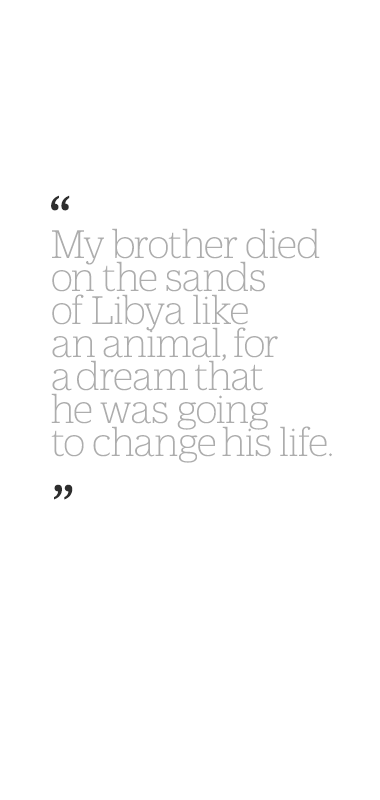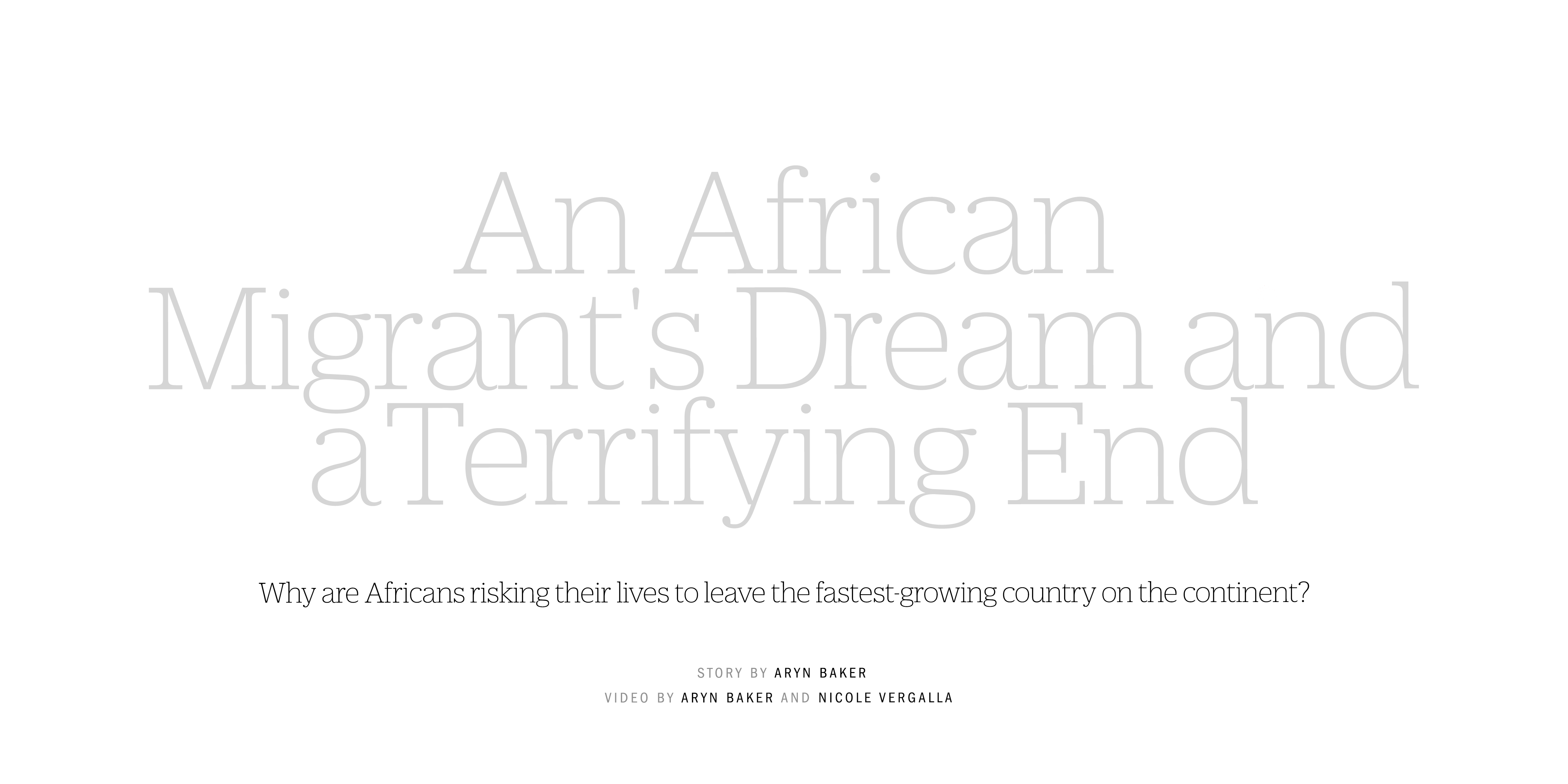One day in late April a new video surfaced on the social media site of the Libyan branch of the Islamic State of Iraq and Greater Syria (ISIS). In it, a dozen men clad in orange jumpsuits kneel on a white sand beach before their knife-wielding executioners. In the next scene, filmed in the desert this time, another 16 prisoners are dressed in black. Behind the kneeling men in black stand 16 masked soldiers of the Islamic State, each holding a pistol to his prisoners’ head. In what has become a familiar trope in ISIS videos, one of the masked men points his pistol to the camera and declares, in a strong American accent, that he is doing the will of Allah.
As the soundtrack crescendos, the 29-minute-long video jumps between scenes of firing-squad carnage and gruesome images of individual beheadings. In the beach scene close-ups, militants drain the blood of their victims into the Mediterranean, staining the sea red.
The action movie-style editing and shock-value symbolism are typical of what the world has come to expect from the lurid propaganda videos made by ISIS. But these victims were not soldiers captured in combat, like the Jordanian pilot burned alive on camera a year ago. They were not even citizens of a country militarily aligned against the Islamic State, like the American journalist James Foley, beheaded by ISIS in August 2014. They were African migrants making their way to a better life in Europe, captured along the route to the smuggler’s boats that depart daily from the Libyan coast for Italy’s shores.

It is on those bloodstained sands that the multiple strands of Europe’s migrant crisis — the rise of ISIS, Libya’s lawlessness, unscrupulous human traffickers and the lure of opportunity and security in European capitals — convene to tell a second chapter. At least seven of the 28 men in the video come from the brutal dictatorship of Eritrea, and—like the Syrians, Afghans and Iraqis crossing into Europe—would have likely been eligible for asylum had they reached their destination.
But most of the men came from Ethiopia, a once-desperately poor East African nation now on track to reach middle-income status in the next ten years, according to the World Bank. Many of the men were educated. Some had jobs, and others ran their own businesses. They, or their families, had enough means to scrape together $3000-$4000 in smuggler’s fees—a fortune in a country whose annual per-capita income is still only $550.
The International Organization for Migration [IOM] estimates that some 80,000 Africans crossed the Mediterranean in 2015, part of to the biggest wave of migrants since World War II. War and terrorism still drive people from their homes: at least seven African nations, from Nigeria under siege by Boko Haram to South Sudan and its civil war, have active conflict zones (Eritreans, Nigerians, Somalis and Sudanese top the list of African migrants to Europe, with Ethiopia not far behind). Climate change and desertification have also had an impact, one that will likely worsen in the years to come.
Yet Africa, despite global perception, is more stable and more prosperous than at any other time in recent history. The continent has averaged five percent growth over the past 15 years, compared to 4.1 percent in Europe and Central Asia and only 3 percent in Latin America. Which raises the question: if Africa is doing so well, why are so many Africans risking their lives to leave?

According to the head of the Association of Ethiopian Overseas Recruitment Agencies, an estimated 200,000 Ethiopians a year use illegal means to seek jobs abroad, mostly to the Middle East, South Africa and Europe. One of them was 38-year old Balcha Belete, a strikingly handsome electrical engineer who lived in Addis Ababa, Ethiopia’s capital, and had a low-paying job with a government-owned power company. The unmarried youngest child of 14 siblings, he was known as the brother you could turn to in an emergency, and the uncle who would do anything for his nieces and nephews.
Yet without saying a word to his close-knit family, Belete left home earlier this year, crossing from Ethiopia into Sudan on Valentine’s Day accompanied by his neighbor, Eyassu Yukuno-Amlak. It was the first step of a journey that would end abruptly in southeastern Libya a little more than two months later, where the two men and fourteen others were filmed being shot, execution style, by soldiers of ISIS. “My brother died on the sands of Libya like an animal, for a dream that he was going to change his life,” says Belete’s sister Belynesh. She, like the rest of her family, only realized that her brother had died when they watched the video of his execution broadcast on a satellite news channel. “He thought he was going to England,” she surmised, breaking into tears over his memory. “But he didn’t even make it to the Mediterranean.”

Ethiopia is not the country you think it is. Rising from the ashes of a devastating famine that killed an estimated 400,000 in the early 1980s and made it a poster child for international misery, Ethiopia has made extraordinary gains in health care, poverty reduction and education. With an average growth of 10.7 percent over the past decade—better than China or India —Ethiopia, which is Africa’s second most populous nation, now has the fastest growing economy in Africa. The government has invested in major infrastructure projects that promise to keep that growth going, from a $4.1 billion hydroelectric dam that will make the country a net exporter of clean energy by 2020 to sub-Saharan Africa’s first metro line, in Addis Ababa.
“There is real progress here,” says Lars Christian Moller, the World Bank’s lead economist in Ethiopia. But, he adds, “that doesn’t mean everybody is happy.” Ethiopia, like Africa as a whole, may be growing at an unprecedented rate, but both are starting from the bottom. “Even if Africa were growing at 20 percent a year across the board, you are still going to have many millions of people who are poor, and many others who are going to want to try their luck abroad.”
Balcha Belete was one of them. He was dissatisfied in his job, say his siblings, and felt that he should have been doing better, considering his skills and education. He also thought that once he made it in Europe, he would be able to bring over his nieces and nephews, to give them the opportunities he found lacking at home. “He always said that he wanted to take all four of us to Germany where we could get a good education,” says his 15-year-old niece Sara Lema.

Ethiopia’s growth may look impressive on paper, but it doesn’t translate to much on the ground, says Belete’s brother Fasika. That, he says, was Belete’s biggest frustration. “We know that this country is constructing roads and buildings. You can see that. But I don’t think that has improved the lives of people here.” Fasika pauses to quote a common Ethiopian saying. “Having enough to eat doesn’t necessarily mean you are living well.”
At least Balcha Belete had a job. Many young Africans don’t, and that lack is one of the principal drivers of migration from the continent, says Mohamed Yahya, the United Nations Development Program’s Africa regional program coordinator, who is based in Addis Ababa. Improved living conditions and reductions in child mortality have contributed to a population boom so great that by 2040, Africa’s working-age population is expected to double to a billion, exceeding that of the rest of the world combined.
But job growth on the continent is not keeping up, particularly for the young. In many countries, youth unemployment is above 38%, according to the International Labor Organization. (In Ethiopia, it’s officially 7.3, because youth enrolled in school are not considered unemployed.) “We succeeded in reducing child mortality, but we forgot about what to do with those children once they become young men and women,” says Yahya. “The reason why we are seeing more young Africans leaving the continent than ever before is because Africa is not providing the jobs that this demographic needs.” Much of Africa’s growth comes from extractive industries, like mining, that doesn’t require much in the way of skilled labor.


Europe has always attracted African migrants seeking better jobs and opportunities, but they weren’t always able to get there. Libya is Africa’s doorstep to Europe, and the collapse of its government following the 2011 uprising and 2012 attacks by the U.S. and France opened up new opportunities for smuggling networks. “The border security and detentions that were put in place by the former Libyan government, which were meant to deter irregular migration, are now cleared off and smugglers and traffickers have better freedom to move,” explains Maureen Achieng, IOM’s chief of mission in Ethiopia.
The smugglers have capitalized on the lawlessness to create a lucrative business ferrying desperate migrants across the Sahara to Libya’s shores. Balcha Belete’s family didn’t know until after his death that he had paid a smuggler 90,000 birr ($4,286) for the crossing. He didn’t pay it all up front, entrusting the funds with his neighbor Yukuno-Amlak’s wife. At each stop in the journey, the two men phoned for her to wire a new tranche of cash to the smuggler’s account, so they could take the next step. Soon after they crossed into Libya, in March, she stopped receiving calls.
Smugglers spin stories of good jobs and instant riches in Europe, and tell prospective migrants that they will be able to help their families by sending money home. The wildly exaggerated accounts are backed by some degree of truth: Africa now receives more money from its expatriates in remittances than it does from international development aid. Ethiopia alone sees some $1.5 billion come in each year from citizens working abroad, even though oversees employment agencies have been banned from recruiting since 2013, pending a government review over how to better protect its citizens laboring in foreign countries.
Like the carefully curated Facebook feed of a former childhood rival who appears to have it all, social media accounts of successful migrants posing next to luxurious homes and expensive cars provide further inducement for those back home. “The ones who risked everything to get to Europe aren’t going to post about their horrible living conditions or life without a work visa,” says political analyst Mehari Taddele Maru, who consults for the African Union on migration policy. “What people back home don’t realize is that the expensive car is one they’ve been hired to wash, and the nice house is where their friend works as an underpaid domestic.”
The smugglers’ most egregious lies, says Maru, are about the safety of the journey, particularly the route through Libya and the central Mediterranean. Of the 3,771 migrants who went missing or died on their way to Europe via the Mediterranean in 2015, nearly 3,000 died on the central route from Libya and Tunisia, according to IOM. The organization says there are rising reports of killed and kidnapped migrants on that route, and that there are additional risks of sexual abuse, torture, imprisonment, deportation and even organ theft.
Yet despite IOM and local government efforts to publicize these risks, the migrants are still willing to gamble. The day after the video of the migrants’ massacre was broadcast in Ethiopia, a young man who lived across the way from the Belete family left for Libya to try his luck, says one family member. Fasika Belete just shakes his head in bewilderment: “After even seeing this inhuman act, people are still trying to migrate.” Last the family heard, he had made it to Italy, but they don’t know what became of him after that.

Taking those kinds of risks for such little reward might not make sense from the outside, says Yahya, of the UNDP, but for many young people, “there is a perception that the risk of staying and being trapped in hopelessness is higher than the risk of dying crossing the Mediterranean.” One would-be migrant told him, “‘let’s say nine out of 10 make it, and one dies. So why do I think that one will be me?’ They don’t calculate based on the risk that they will be the next one slaughtered by ISIS.”
The Ethiopian government has enacted some of the continent’s harshest laws against human trafficking, mandating steep fines, lengthy jail sentences and even the death penalty for people smugglers. “You can call [the law] draconian, but whoever messes with the lives of our youngsters for the purpose of making money sending them to drown in the Mediterranean in the hopes of a golden life in Europe, well we will make sure they will get it in the neck,” says government spokesman Getachew Reda. (While nominally a democracy, Ethiopia’s authoritarian-style government has been accused by several human rights organizations of being intolerant of dissent. However, this does not appear to be a major driver of migration from the country.)
But laws against smuggling are not enough. Ethiopia, like Africa as a whole, needs to create opportunities at home that rival foreign countries’ ability to attract migrants, says Zerihun Yeshitla of Ethiopia’s Ministry of Labor and Social Affairs. “If they don’t have their own business, if they don’t have a job, if they don’t have something keeping them here, they will go abroad. We need to give them a reason to stay.” In Africa, that means creating some 18 million jobs across the continent every year simply to absorb new entries into the labor force, according to the International Labor Organization. It also means encouraging entrepreneurship, so that Africans can create the businesses that create even more jobs.
Yet the most entrepreneurial Africans, the ones who could build those businesses, are the ones being driven abroad. The Ethiopians killed by ISIS were not illiterate, impoverished people fleeing hunger, but rather skilled high school and university graduates. This is often the case with economic migrants from Africa. “The people who we are losing, they are economically active, they are dynamic, they are people who refuse to live in poverty,” says Yahya. “They are people who are so enterprising that they want to get out of their poor conditions. These are the people Africa needs: the ambitious, driven risk-takers.” And, he adds, migrants are the ones who have a proven ability to collect funds to pay off smugglers. It’s ironic that the $4000 it costs to pay passage to Europe would be enough to start a small business in Ethiopia.
Keeping those driven, entrepreneurial Africans at home has another virtue—they are the kinds of citizens who can push for change. “Once you have people determined to stay at home, that is when they start demanding better governance, better growth, better education and better services,” says Maru, which in turn makes future generations less likely to look abroad for opportunity. “Balcha was just trying to make life better for his family,” says his sister Meeaza. “That dream died in Libya.” If Africa’s long-heralded rise does not come with opportunities for its growing population, many more migrants will keep aiming for Europe’s shores. And many more will die in the process. —with reporting by Binyam Tamene/Addis Ababa
